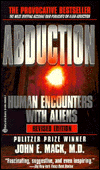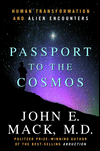
John Mack, M.D.
John E. Mack, M.D., professor of psychiatry at Harvard Medical School and founder of the Center for Psychology & Social Change, explores how extraordinary experiences can affect personal, societal and global transformation. He is the author of many books detailing how one's perceptions shape relationships with one another and with the world, including the Pulitzer Prize-winning biography of T.E. Lawrence, A Prince of Our Disorder, Abduction, and Passport to the Cosmos: Human Transformation and Alien Encounters.
articles & documents
A Brief Review of Issues Relating to the Reality of the Abduction Phenomenon
John Mack, M.D.
Since the publication of the hardcover edition of "Abduction", questions have been raised about the reality of the alien abduction phenomenon. These questions relate to the nature of the physical evidence which accompanies the abduction reports; the clients' expectations and possible investigator influence; the reliability of memory; the degree to which hypnosis influences the accuracy of memory; and alternatives to the hypothesis that what the experiencers describe is what has occurred. These are questions that can only be answered fully by a great deal more research. This appendix has been added to begin a discussion of these questions… R
A More Parsimonious Explanation for UFO Abduction
Caroline McLeod, Barbara Corbisier, and John E. Mack
A comprehensive commentary published in Psychological Inquiry, An International Journal of Peer Commentary and Review, Vol. 7 No. 2, 1996 We present evidence that abduction experiences cannot be readily explained by constructs such as hypnotic elaboration, masochism, and fantasy proneness. Abduction accounts cannot be dismissed as hypnotic elaboration because approximately 30% of these accounts are obtained without hypnosis. Finally, there is evidence that individuals reporting abduction experiences are not more hypnotizable or fantasy prone than the general population. R
Alien Abduction: Political, Economic, and Religious Implications
John Mack, M.D.
It is not altogether clear to me why we become so attached to our ways of seeing the world. Perhaps a comprehensive scientific paradigm, like any ideology, gives a sense of mastery and power. Mystery and the sense of not knowing are antithetical to the need to maintain control and seem, at times, to inspire such terror that we fear that we might blow apart, like the frog in the Tibetan story when confronted with a universe too vast to comprehend. This might explain why it is the intellectual and political elite in our culture that seems most deeply wedded to perpetuating the materialist view of reality. R
Brief bio of John Mack, MD
John E. Mack, M.D., professor of psychiatry at Harvard Medical School and founder of the Center for Psychology & Social Change, explores how extraordinary experiences can affect personal, societal and global transformation. R
Harvard Professor Takes Alien Abduction Seriously
George Knapp, Las Vegas Mercury, January 30, 2003 (UFO Area)
I first met Dr. John Mack in 1993 at a tiny UFO conference in the Ozarks. The publication of Dr. Mack's book about alleged alien abductions was still a year away, but the fact that a professor from the Harvard Medical School was taking the phenomena seriously was big news in the UFO field. Mack was an immediate celebrity, although he seemed to wear the mantle with some reluctance.
Interview with Dr. John E. Mack
SciFi.com, October 2002
SciFi.com interview with Dr.John E. Mack, professor of psychiatry at Harvard Medical School and a leading authority on the transformative and spiritual aspects of alien encounters. R
Interview with Dr. John E.Mack, October 2002
SciFi.com moderated online chat
Transcript of an interview with Dr. John Mack, a professor of psychiatry at Harvard Medical School and a leading authority on the transformative and spiritual aspects of alien encounters. Dr. Mack answers such questions as "Where do you think aliens come from?" R
Kidnapped by UFOs? - Interview with John Mack
PBS NOVA
Interview with John Mack, MD - Harvard psychiatrist, Pulitzer Prize-winning author and leading abduction researcher. R
Letter to Harvard University in defense of Harvard psychiatrist Dr. John Mack
Dr. Bruce Cornet, Ph.D.
Even if Dr. Mack communicates his personal beliefs regarding these phenomena, or his personal beliefs are known to the patient prior to counseling, his integrity and honesty would have far less damaging effect than a psychiatrist who does not believe in the reality of such experiences or who refuses to consider such a reality when treating a patient. R
Studying Intrusions from the Subtle Realm: How Can We Deepen Our Knowledge?
John E. Mack, M.D.
I want to talk with you about what I have been finding over the past now nearly six years in studying the alien abduction phenomenon. In the context of this meeting I wish to talk particularly about the ways that we know, how we actually know anything. What is the appropriate epistemology for a particular subject?
The Alien Abduction Phenomenon
John Mack, M.D.
An overview published in Noetic Sciences Review, Autumn 1992, two years prior to the publication of "Abduction: Human Encounters with Aliens" Even though over the past 25 years thousands of individuals throughout the United States and in other countries have reported abduction experiences to UFO investigators and mental health pro-fessionals, the phenomenon appears to be more widespread than anyone might have expected. The fact that a phenomenon defies conventional ex-planation, or even challenges our notions of reality, should not permit us to ignore its existence or prevent us from exploring its di-mensions and significance.In this article I describe the basic features of the UFO abduction experience, the impact these experiences have on the abductees, and the implications of the phenomenon for our profession and society. R
The UFO Abduction Phenomenon- What Does it Mean for the Transformation of Human Consciousness
John Mack, M.D.
The author describes how he got into the study of the UFO abduction experience, a bit of the history of the field, the phenomenology of UFO abductions, who the abductees are, his use of nonordinary states of consciousness in working with them, some of the physical evidence involved, what effect being abducted has on the abductees, and his interpretation of the meaning of the experience. UFO abductions are not a rare phenomenon and have been estimated to have occurred to three-million Americans. There is a remarkably precise correspondence to the reports. Abductees exhibit relatively little psychopathology.
Trauma, Transformation and Cosmic Awareness: Review of John E. Mack's 'Passport to the Cosmos'
Albert A. Harrison, Ph.D., University of California, Davis
Psychiatrist John Mack's Passport to the Cosmos takes a fresh look at the alien abduction experience. This relatively brief, organized and readable work departs in significant ways from Mack's earlier Abductions: Human Encounters with Aliens (Crown, 1994) which was organized around case histories. R
Why the Abduction Phenomenon Cannot Be Explained Psychiatrically
John Mack, M.D.
...Even psychosocial or cultural explanations, if they were to include all of the major dimensions of the syndrome, would force us to stretch our notions of the collective unconscious to such a degree that the distinctions between psyche and world, internal and external reality, would be obliterated…
websites & organizations
Passport to the Cosmos - John Mack, M.D.
This website is an archive of some of the best interviews and writings of (and about) Pulitzer Prize-winning author and Harvard professor of psychiatry John E. Mack, M.D.
The John E. Mack Institute
Formerly the Center for Psychology & Social Change founded by John Mack, M.D., the Institute explores the ways in which perceptions and beliefs about reality shape the human condition. Our Research, Clinical, and Educational initiatives examine the nature of reality and experience while providing a safe environment for healing discoveries. Our aim is to apply this emerging knowledge to pressing psychological, spiritual and cultural issues.
books
 Abduction: Human Encounters with Aliens John E. MackA Pulitzer Prize-winning biographer and psychiatrist now reveals the results of four years of intensive research and investigation into the serious, ever-growing phenomenon of alien abduction. When respected Harvard psychiatrist John E. Mack, M.D., first published these astonishing results of four years of intensive research and investigation into alien abduction, he unleashed a firestorm of controversy. Now, in this paperback edition, Mack answers his critics, both believers and skeptics. Mack focuses on thirteen ordinary Americans (from nearly one hundred case studies) who tell dramatic, inspiring, and remarkably similar stories: repeated visits from large-eyed beings, mysterious machines, telepathy, invasive medical procedures, hours missing from their lives, and startling messages about the future....
Buy from Amazon
Buy from Barnes & Noble
more info...
Abduction: Human Encounters with Aliens John E. MackA Pulitzer Prize-winning biographer and psychiatrist now reveals the results of four years of intensive research and investigation into the serious, ever-growing phenomenon of alien abduction. When respected Harvard psychiatrist John E. Mack, M.D., first published these astonishing results of four years of intensive research and investigation into alien abduction, he unleashed a firestorm of controversy. Now, in this paperback edition, Mack answers his critics, both believers and skeptics. Mack focuses on thirteen ordinary Americans (from nearly one hundred case studies) who tell dramatic, inspiring, and remarkably similar stories: repeated visits from large-eyed beings, mysterious machines, telepathy, invasive medical procedures, hours missing from their lives, and startling messages about the future....
Buy from Amazon
Buy from Barnes & Noble
more info...
 Passport to the Cosmos: Human Transformation and Alien Encounters John E. MackIn his follow-up to Abduction, John E. Mack, M.D., demonstrates how the alien abduction phenomenon calls for a revolutionary new way of examining the nature of reality and our place in the cosmos.. "For Mack, the alien abduction phenomenon is nothing short of a cosmic wake-up call to humans that we do indeed live in a world filled with spirits and beings who can cross the barrier we have thrown up between the material and immaterial worlds. Drawing on the rich tradition of non-Western and indigenous cultures, which more readily accept that we live in a multidimensional universe, Mack persuasively shows that by broadening our definition of "what is real," we can begin to explore a phenomenon that has deep and lasting implications for humanity.
Buy from Amazon
Buy from Barnes & Noble
more info...
Passport to the Cosmos: Human Transformation and Alien Encounters John E. MackIn his follow-up to Abduction, John E. Mack, M.D., demonstrates how the alien abduction phenomenon calls for a revolutionary new way of examining the nature of reality and our place in the cosmos.. "For Mack, the alien abduction phenomenon is nothing short of a cosmic wake-up call to humans that we do indeed live in a world filled with spirits and beings who can cross the barrier we have thrown up between the material and immaterial worlds. Drawing on the rich tradition of non-Western and indigenous cultures, which more readily accept that we live in a multidimensional universe, Mack persuasively shows that by broadening our definition of "what is real," we can begin to explore a phenomenon that has deep and lasting implications for humanity.
Buy from Amazon
Buy from Barnes & Noble
more info...





